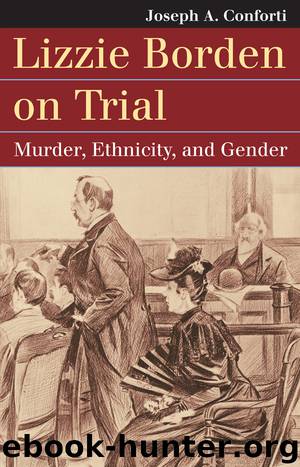Lizzie Borden on Trial by Joseph A. Conforti

Author:Joseph A. Conforti
Language: eng
Format: epub
Publisher: University Press of Kansas
Published: 2015-03-04T16:00:00+00:00
Is Lizzie Insane?
Neither District Attorney Knowlton nor Attorney General Pillsbury, who usually tried capital cases, wanted to prosecute Lizzie. Though Knowlton believed she was guilty, a conviction presented chancy odds, especially if the Superior Court denied the admissibility of Lizzie’s inquest testimony. Something had to be done to preempt a trial yet appease a segment of the population, such as the working-class, largely Catholic readers of the Fall River Globe, that the legal system was not rigged to favor one class, or one family. An insanity plea or finding offered Knowlton and Pillsbury an escape from their legal bind.
At the time of the murders newspapers commented that only a demented man could have committed the atrocities. Even before the preliminary hearing the attorney general had begun to seek professional advice on whether Lizzie was insane. He wrote to Dr. George F. Jelly, the former superintendent of the pioneering McLean Hospital for the Insane outside of Boston. On August 29, Pillsbury informed Knowlton that Dr. Jelly said he did not know enough about the case and was therefore unable to make a judgment about insanity.
The attorney general then turned to Dr. Edward Cowles, who had succeeded Jelly as superintendent of McLean. He also said that he did not have enough information. However, he offered more than Jelly. He wrote: “My inferences have been against a theory of insanity. . . . from anything I have so far read concerning her [Lizzie’s] conduct before or after the event.”
The attorney general, in particular, persisted. He prevailed on the district attorney to approach Lizzie’s lawyer about a joint insanity examination. Jennings refused on the grounds that he would do nothing that indicated his client was guilty. “We can make some inquiries into the family matters without him,” Knowlton suggested to the attorney general, “but it would not be so thorough as it would if we had his assistance.”
In November the district attorney directed a state detective to interview people who had knowledge of Lizzie’s family to find out if there was any history of insanity. On November 24, 1892, the detective forwarded his discouraging report to Knowlton. The informants ranged from prominent businessmen to neighbors and former neighbors. John S. Brayton was one of Spindle City’s mandarins. He lived on The Hill and managed the business affairs of his sister Mary, the former wife of the late Bradford Durfee and the wealthiest woman in Fall River. Brayton knew of Lizzie’s mother and her father. “I never heard of any one of them being Insane or having any streak of insanity,” he reported. Abby Borden’s half sister offered that she “never heard that any of the Morses was Insane, but Lizzie is known to be ugly.” Others said the Morses, including Lizzie’s mother, were “peculiar,” “odd,” and “of a bad disposition.” Yet no one knew of any insanity among the Morses or in Andrew’s family.
Knowlton sought a legal lifeline, something that would rescue him from pursuing Lizzie into Superior Court. No significant incriminating evidence had surfaced in the weeks after the preliminary hearing.
Download
This site does not store any files on its server. We only index and link to content provided by other sites. Please contact the content providers to delete copyright contents if any and email us, we'll remove relevant links or contents immediately.
| Espionage | Hoaxes & Deceptions |
| Murder & Mayhem | Organized Crime |
| Serial Killers | White Collar Crime |
Mindhunter: Inside the FBI's Elite Serial Crime Unit by John E. Douglas & Mark Olshaker(9345)
Wiseguy by Nicholas Pileggi(5789)
Room 212 by Kate Stewart(5128)
Hitman by Howie Carr(5097)
Secrecy World by Jake Bernstein(4754)
Killers of the Flower Moon: The Osage Murders and the Birth of the FBI by David Grann(4449)
Papillon (English) by Henri Charrière(4276)
Breaking Free by Rachel Jeffs(4218)
Killers of the Flower Moon by David Grann(4059)
Say Nothing by Patrick Radden Keefe(3990)
American Kingpin by Nick Bilton(3890)
The Secret Barrister by The Secret Barrister(3713)
Molly's Game: From Hollywood's Elite to Wall Street's Billionaire Boys Club, My High-Stakes Adventure in the World of Underground Poker by Molly Bloom(3539)
Mysteries by Colin Wilson(3456)
In Cold Blood by Truman Capote(3386)
Signature in the Cell: DNA and the Evidence for Intelligent Design by Stephen C. Meyer(3139)
I'll Be Gone in the Dark by Michelle McNamara(3083)
Rogue Trader by Leeson Nick(3046)
Bunk by Kevin Young(3001)
